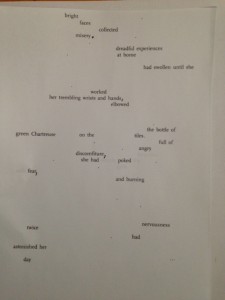Click on any title (in bold) to submit a comment.
-
Beth Ayer’s April 29 Impromptu prompt to write a poem from an unintelligible text (in your own language)
Beth Ayer’s challenge through FPR was as follows: “In the spirit of heading into darkness after all things unseeable and obscure, write a poem using a text that is inexplicable to you. Could be quantum physics, thermodynamics, mathematics, aeronautical engineering – or something else altogether that to you speaks in incomprehensible language. Choose a text or texts and begin selecting words and phrases as they spark associations. Write a poem using the collected words and phrases. Let your imagination fire, and don’t worry about what these terms mean in their original context.”
I went online and used phrases and words largely unaltered from an article from European Nuclear Society (euronuclear.org.) What Is A Nuclear Reactor? to respond to the prompt on this penultimate day of National Poetry Month. I certainly didn’t understand the technicalities in the article when I composed the poem below. Comments are welcome.
This basic difference
After the separation
converted their bond,
transferred power
for multiple purposes,
fission released them.Before they escaped
slightly enriched,
they felt intense deceleration,
released from the laws of nature,
the pressure to combine.Devices designed in a loop
fed into the fuel they use:
The same, reinforced, secondary light. -
Irresistible prompt to write online erasure poem (April 27, Greg Santos in FPR)
I will return to April 28’s fine prompt from Jenni B. Baker in FPR which warrants far more time than one day provides.
Instead, I chose one of Greg Santos’s from yesterday to: “Go to Wave Books’ Erasures website to find online source texts…The cool website lets you click on any word or punctuation mark to make it disappear. You can save, print, or email the newly sculpted text when you’re done.”
Well, I went to the site, which, indeed, worked as he suggested. In fact, I felt a ‘frisson’ of power as I erased parts of the source text “Pointed Roofs,” by Dorothy Miller Richardson.
I failed dismally, though, when I attempted to save and email the poem, though I could print it.
So you see, above how “Home Schooled” appears, to which I added punctuation by hand, though I seem to have mislaid the period at the end. Sigh.
Here is how it reads:
Home schooled
Bright faces collected misery.
Dreadful experiences at home had swollen
until she worked her trembling wrists and hands,
elbowed the bottle of green Chartreuse on the tiles.
Full of angry discomfiture, she had poked fear,
and burning nervousness twice
had astonished her day. -
April 27 Impromptu from Greg Santos in Found Poetry Review to write a reversal poem
Though it proved hard to select which of Greg Santos’ April 27 prompts to follow, I chose this one: “Find a draft of a poem you’ve already written. Rewrite your new poem backwards, writing the last stanza first and so on. The new order might reveal something new and exciting.” I began with a piece I had posted in response to the day 6 FPR prompt to create a poem comprised of a single sentence, spread across at least seven lines of no fewer than five words each, in which I had to repeat one of the lines three times, but not in succession, and include specific vocabulary.
Here is my April 6 original.
Uncle
You make me do what I don’t want to
but I can’t pretend I don’t understand —
you: Self-satisfied, self-pleasured, self-absorbed, self-ish Sam—
you speak to me in dialects I wish were foreign
or that I’d need a cochlear implant to hear
but I can’t pretend I don’t understand
which is to say I’m like helianthus facing south and west
as when the sun goes down toward Ecuador
and I turn, too, because you make me do what I don’t want to
but I can’t pretend I don’t understand.Here is the first reversal I tried, where I simply began with the last line and worked back to the first (with one minor word change, some line break adjustments and the addition of punctuation.)
I can’t pretend I don’t understand,
but I turn, too, because you make me do what I don’t want to,
as when the sun goes down toward Ecuador,
which is to say I’m like helianthus facing south and west.But I can’t pretend I don’t understand,
or that I’d need a cochlear implant to hear
you speak to me in dialects I wish were foreign,
you self-satisfied, self-pleasured, self-absorbed, selfish Sam.But I can’t pretend I don’t understand
you make me do what I don’t want to, uncle.Here is a variation on the first reversal,with line breaks all changed and a surprise reversal of victims in the last line. Who would have expected that?
But I can’t.
Pretend I don’t understand.
But I turn, too, because you make me.
Do what I don’t want to,
as when the sun goes down toward Ecuador,
which is to say
I’m like helianthus, facing south and west.
But I can’t pretend.
I don’t understand.
I’d need a cochlear implant to hear you, uncle.Speak to me in dialects I wish were
foreign, you self-satisfied, self-pleasured,
self-absorbed, selfish Sam.
But I can’t pretend.
I don’t understand.
You make me do what I don’t want
to uncle. -
April 26 prompt: Write a call-and-response poem
This prompt from NaPoWriMo.net resonated with me. Here’s what was suggested:“Calls-and-responses are used in many sermons and hymns, in which the preacher or singer asks a question or makes an exclamation, and the audience responds with a specific, pre-determined response….as a sort of refrain or chorus that comes up repeatedly, while the call can vary slightly each time it is used….Think of your poem as an interactive exchange between one main speaker and an audience.”
For once, I allowed myself to have a good time trying something new without setting expectations that were too high. I wrote two poems as a result.
Psalm for Hestia
Let him persuade you, let him cajole you!
I’ll not listen, I’ll not heed.He has love to offer, let him show you!
I’ll not listen, I’ll not heed.He will want you always, let him please you!
I’ll not listen, I’ll not heed.He will hope and hope, let him win you!
I’ll not listen, I’ll not heed.Let him persuade you he has love to offer.
He will want you always. He will hope and hope.
I’ll not listen, I’ll not heed.Let him cajole you. Let him show you.
Let him please you. Let him win you.
I’ll not listen. I’ll not heed.Imaginary numbers: A song
How many rings on the tree, on the tree?
How many rings will there be, will there be?
Too many, too many, too many to count.
Too many, too many for me.How many birds on the wing, on the wing?
How many birds will there be, will there be?
Too many, too many, too many to count.
Too many, too many for me.How many drops in the rain, in the rain?
How many drops will there be, will there be?
Too many, too many, too many to count.
Too many, too many for me.How many moments in a life, in a life?
How many will there be, will there be?
Too many, too many, too many to count.
Too many, too many for me. -
April 25 Impromptu Found Poetry Review Challenge — a homophonic interpretation
This prompt from Nancy Chen Long “involves reading a poem in another language that you do not speak. The language of the poem you select must be one in which you don’t know what’s being said, so that your imagination has greater room to play… Find a poem in its original language….Sound out the poem and “translate” it based on what you hear. Of course, your translation won’t be exact—getting words anywhere near the ballpark of what you think you hear is good.”
A very difficult process. I could feel my brain trying to make sense out of sounds. I had tried to channel Lewis Carroll, but I admit what I came up with is close to nonsense. Still, an experiment worth trying.
Candidates
Come here to the village, men. All cast votes = your loss, pain.
Be easy on how to do a man’s profession. Looting – must do that,
wear that? Worse? Do what? Not run.
Come here to the village, men. I concoct tests
from ocean banks and
propose to you, hellmen, power. Come here. Let me like ya.
Here are the first 6 lines of the original by Finish poet Olli Heikkonen
Kumarra pihlajaa. Sen alle kasvot ylöspäin
veljesi on haudattu. Maan povessa luut
mustuvat, yrtit versovat nikamiin.
Kumarra pihlajaa, sen ihonkaltaista kuorta, oksan hankaan
ripustettua helminauhaa. Kumarra latvan liekkiä.
Juuret lävistävät veljesi rinnan.
Juuret lävistävät veljesi otsan.
Pihlaja on ääniä täynnä, jotka keväällä
puhkeavat lehdiksi.
© 2000, Olli Heikkonen
Uit: Jakutian aurinko
Uitgever: Tammi, Helsinki, 2000

